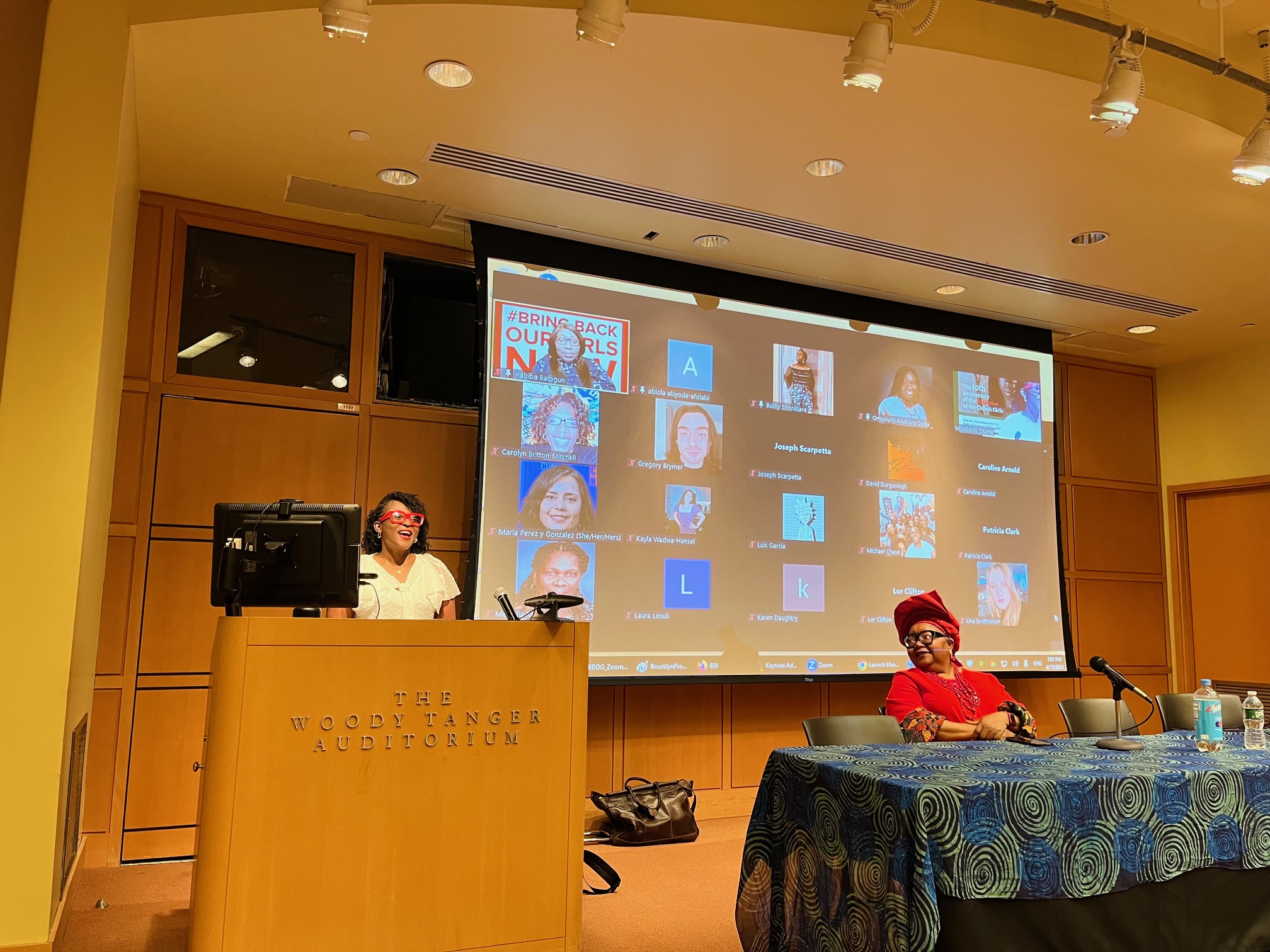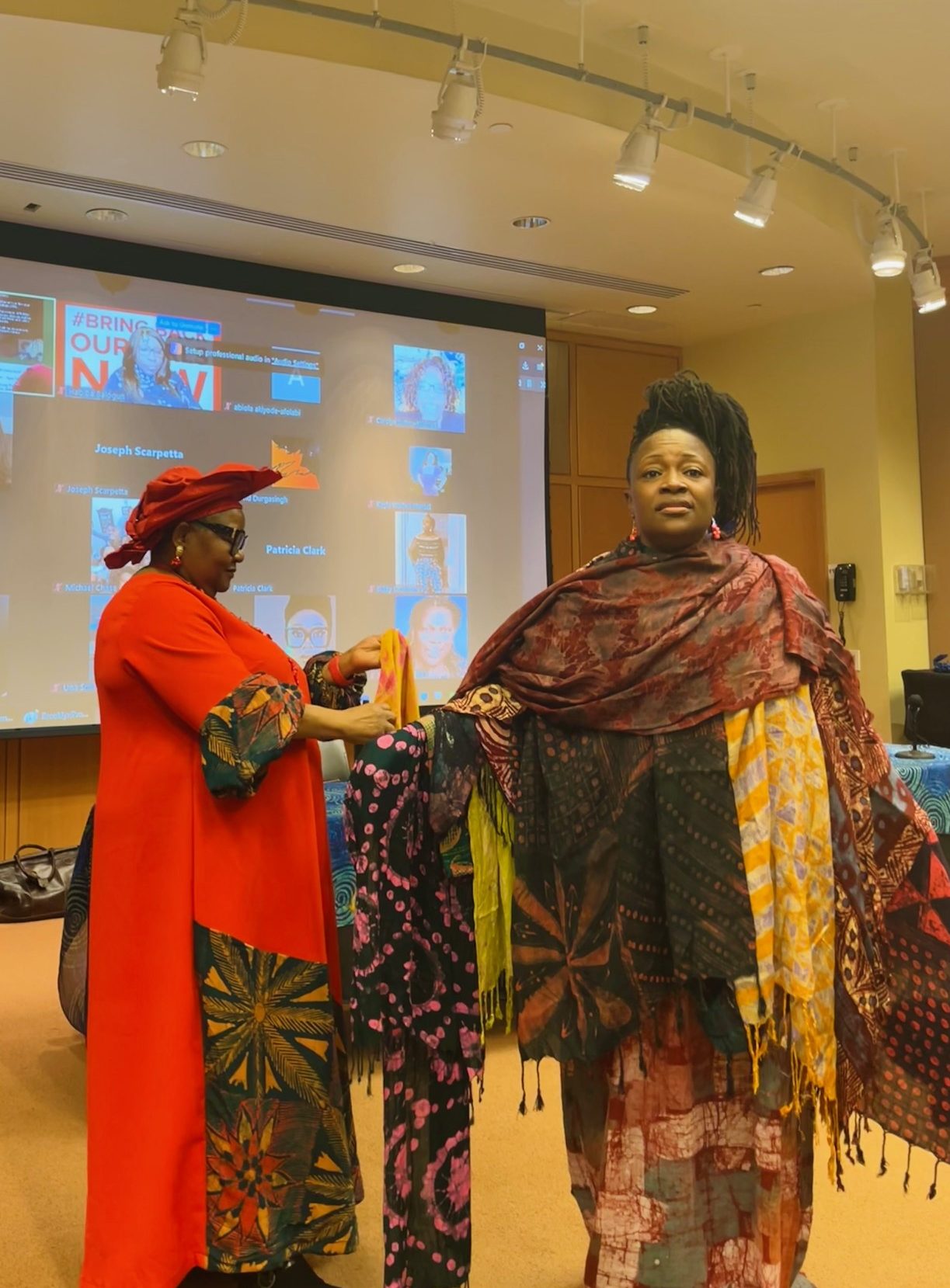Of the 276 Nigerian school girls kidnapped by Boko Haram from Chibok Girls Secondary School in 2014, 91 remain in captivity today.
BY MOLLY BANGS, PROGRAM OFFICER

Dr. Gbemisola Abiola (left) speaks during the panel while Professor Okome (right) looks on.
Photo credit: Molly Bangs
“The Nigerian people — like all people in the world — want to be secure. This was taken away from the Chibok girls in the most brutal way.” Professor Mojúbàolú Olúfúnké Okome, Brooklyn College Department of Political Science, recounted the April 14, 2014 Boko Haram abduction of 276 teenage school girls from the Chibok Girls Secondary School.
Ten years later, 91 of the girls, now women, remain in Boko Haram captivity. Professor Okome, who co-founded #BringBackOurGirlsNYC hosted an April 17, 2024 anniversary event, “Remembering the Chibok Girls: A Decade of Resilience.” The event, which was co-sponsored by the Institute on Gender, Law, and Transformative Peace at CUNY School of Law, and the Departments of Political Science, Africana Studies, Puerto Rican and Latino Studies at Brooklyn College, as well as its Black Faculty and Staff and Women’s Center, included a panel discussion, keynote address, performance, and tribute to those abducted.
The panel was moderated by Professor Okome, and brought together a diverse panel of experts, including academics, activists, and community leaders, to discuss the impact of the abduction of the Chibok girls on Nigeria and the world, the progress made in the past decade, and the challenges that still remain. Professor Okome set the stage by discussing the political economy that has formed around Boko Haram and around abduction, and the human resources provided by the abducted in the form of sexual servitude and forced motherhood. As she explained, Boko Haram has continued abducting masses of people in the past decade, and has used many of these young girls as suicide bombers. Professor Okome highlighted how the group is responsible for the deaths of tens of thousands of people and the internal displacement of 2.5 million people in Nigeria — and how Boko Haram has now expanded to other West African countries such as Cameroon, Chad, and Niger.
The panelists set out to discuss the realities of Nigeria’s political climate and Boko Haram, and what is being done to counter it. A group of experts including academics, activists, and community leaders who have been stalwarts of the Bring Back Our Girls campaign, the panel was comprised of: Ms. Bukky Shonibare, Executive Director of Invictus Africa; Ms. Ayo Obe, a legal practitioner and trustee of the International Crisis Group; Dr. Abiola Akiyode-Afolabi, public law senior lecturer at the University of Lagos and founding director of the Women Advocates Research and Documentation Center (WARDC); Ms. Wumi Asubiaro-Dada, human rights lawyer and PhD candidate at the University of Toronto; and Dr. Gbemisola Abiola, anthropologist and human security consultant. They offered recommendations for what can be done by communities, government, and international civil society. Dr. Abiola reminded the audience that the efforts must extend beyond bringing abducted Chibok girl home: “How do we ensure that people who have returned are able to find the support they need? How do we revive community, rebuild trust?”
“How do we ensure that people who have returned are able to find the support they need? How do we revive community, rebuild trust?” – Dr. Gbemisola Abiola

Shayee gives an interactive performance honoring the Chibok girls that Professor Okome takes part in. Photo credit: Molly Bangs
In a recorded keynote address, Dr. Aisha Muhammed-Oyebode, CEO of the Murtala Muhammed Foundation and author of the book The Stolen Daughters of Chibok, discussed the commodification of women’s bodies and the calculated strategy of using women and girls as pawns in larger political contexts.
The event closed with an interactive musical performance, “Songs of Resilience and Solidarity,” by Oluwaseyi Awoyomi (Shayee), artist and performer, followed by a moment of silent reflection and remembrance of the Chibok girls and all victims of violence and injustice.
In her keynote, Dr. Muhammed-Oyebode also spoke of hope: “Bring Back Our Girls highlighted the power of collective action… we must continue to organize and fight. It’s a call to action for all of us.”
A video of the event is available here; follow Bring Back Our Girls NYC’s latest updates here.
